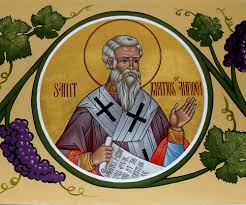Today in the Latin Catholic Church we celebrate the memorial of a very famous first century church father named St. Ignatious of Antioch. (50-107 AD)

St. Ignatius of Antioch was a convert from paganism to Christianity. He succeeded St. Peter the apostle as bishop of Antioch, Syria. He served during the persecution of Domitian. During the persecution of Trajan, he was ordered to be taken to Rome in chains to be devoured by the wild beasts. During his months long voyage he wrote encouraging letters to the parishes and other diocese around him. During his voyage to death he did not want anyone to prevent his martyrdom. He was one of the first to use the term Catholic. Legend says he was the infant Jesus took into his arms in Mark 9. He was closest to St. John the last apostle to die.
The reason why he is so fundamental is because he shows how the early church was catholic by writing on the priesthood, bishopric, and Eucharist.
Bishopric. Priesthood, Diaconate
“See that ye all follow the bishop, even as Jesus Christ does the Father, and the presbytery as ye would the apostles; and reverence the deacons, as being the institution of God. Let no man do anything connected with the Church without the bishop. […] Wherever the bishop shall appear, there let the multitude [of the people] also be; even as, wherever Jesus Christ is, there is the Catholic Church. […] Whatsoever [the bishop] shall approve of, that is also pleasing to God, so that everything that is done may be secure and valid.” (St. Ignatius: Letter to the Smyrnaeans; Ch 8)
“Let all things therefore be done by you with good order in Christ. Let the laity be subject to the deacons; the deacons to the presbyters; the presbyters to the bishop; the bishop to Christ, even as He is to the Father.” (St. Ignatius: Letter to the Smyrnaeans; Ch 9)
“It is becoming, therefore, that ye also should be obedient to your bishop, and contradict him in nothing; for it is a fearful thing to contradict any such person. For no one does [by such conduct] deceive him that is visible, but does [in reality] seek to mock Him that is invisible, who, however, cannot be mocked by any one. And every such act has respect not to man, but to God.” (St. Ignatius: Letter to the Magnesians; Ch 3)
“Some indeed give one the title of bishop, but do all things without him. Now such persons seem to me to be not possessed of a good conscience, seeing they are not stedfastly gathered together according to the commandment.” (St. Ignatius: Letter to the Magnesians; Ch 4)
“Wherefore it is fitting that ye also should run together in accordance with the will of the bishop who by God’s appointment rules over you. Which thing ye indeed of yourselves do, being instructed by the Spirit. For your justly-renowned presbytery, being worthy of God, is fitted as exactly to the bishop as the strings are to the harp. Thus, being joined together in concord and harmonious love, of which Jesus Christ is the Captain and Guardian, do ye, man by man, become but one choir; so that, agreeing together in concord, and obtaining a perfect unity with God, ye may indeed be one in harmonious feeling with God the Father, and His beloved Son Jesus Christ our Lord.” (St. Ignatius: Letter to the Ephesians; Ch 4)
Take care to do all things in harmony with God, with the bishop presiding in the place of God, and with the presbyters in the place of the council of the apostles, and with the deacons, who are most dear to me, entrusted with the business of Jesus Christ, who was with the Father from the beginning and is at last made manifest — Letter to the Magnesians 2, 6:1
Wherever the bishop appears, there let the people be; as wherever Jesus Christ is, there is the Catholic Church. It is not lawful to baptize or give communion without the consent of the bishop. On the other hand, whatever has his approval is pleasing to God. Thus, whatever is done will be safe and valid. — Letter to the Smyrnaeans 8
Eucharist:
Take note of those who hold heterodox opinions on the grace of Jesus Christ which has come to us, and see how contrary their opinions are to the mind of God… They abstain from the Eucharist and from prayer, because they do not confess that the Eucharist is the Flesh and blood of our Savior Jesus Christ, Flesh which suffered for our sins and which the Father, in his goodness, raised up again. They who deny the gift of God are perishing in their disputes. —Letter to the Smyrnaeans, Ch 6
Let that be deemed a proper Eucharist, which is administered either by the bishop, or by one to whom he has entrusted it.—Letter to the Smyrnaeans, Ch 8
